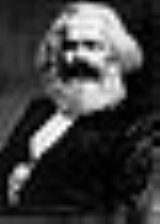Karl Heinrich Marx was a German
philosopherPhilosophy is the study of general and fundamental problems, such as those connected with existence, knowledge, values, reason, mind, and language. Philosophy is distinguished from other ways of addressing such problems by its critical, generally systematic approach and its reliance on rational...
,
economistEconomics is the social science that analyzes the production, distribution, and consumption of goods and services. The term economics comes from the Ancient Greek from + , hence "rules of the house"...
,
sociologistSociology is the study of society. It is a social science—a term with which it is sometimes synonymous—which uses various methods of empirical investigation and critical analysis to develop a body of knowledge about human social activity...
,
historianA historian is a person who studies and writes about the past and is regarded as an authority on it. Historians are concerned with the continuous, methodical narrative and research of past events as relating to the human race; as well as the study of all history in time. If the individual is...
,
journalistJournalism is the practice of investigation and reporting of events, issues and trends to a broad audience in a timely fashion. Though there are many variations of journalism, the ideal is to inform the intended audience. Along with covering organizations and institutions such as government and...
, and
revolutionary socialistThe term revolutionary socialism refers to Socialist tendencies that advocate the need for fundamental social change through revolution by mass movements of the working class, as a strategy to achieve a socialist society...
. His ideas played a significant role in the development of social science and the
socialist political movementSocialism is an economic system characterized by social ownership of the means of production and cooperative management of the economy; or a political philosophy advocating such a system. "Social ownership" may refer to any one of, or a combination of, the following: cooperative enterprises,...
. He published various books during his lifetime, with the most notable being
The Communist ManifestoThe Communist Manifesto, originally titled Manifesto of the Communist Party is a short 1848 publication written by the German Marxist political theorists Karl Marx and Friedrich Engels. It has since been recognized as one of the world's most influential political manuscripts. Commissioned by the...
(1848) and
CapitalDas Kapital, Kritik der politischen Ökonomie , by Karl Marx, is a critical analysis of capitalism as political economy, meant to reveal the economic laws of the capitalist mode of production, and how it was the precursor of the socialist mode of production.- Themes :In Capital: Critique of...
(1867–1894); some of his works were co-written with his friend, the fellow German revolutionary socialist
Friedrich EngelsFriedrich Engels was a German industrialist, social scientist, author, political theorist, philosopher, and father of Marxist theory, alongside Karl Marx. In 1845 he published The Condition of the Working Class in England, based on personal observations and research...
.
Born into a wealthy middle class family in
TrierTrier, historically called in English Treves is a city in Germany on the banks of the Moselle. It is the oldest city in Germany, founded in or before 16 BC....
, formerly in Prussian Rhineland now called Rhineland-Palatinate, Marx studied at both the
University of BonnThe University of Bonn is a public research university located in Bonn, Germany. Founded in its present form in 1818, as the linear successor of earlier academic institutions, the University of Bonn is today one of the leading universities in Germany. The University of Bonn offers a large number...
and the University of Berlin, where he became interested in the philosophical ideas of the
Young HegeliansThe Young Hegelians, or Left Hegelians, were a group of Prussian intellectuals who in the decade or so after the death of Hegel in 1831, wrote and responded to his ambiguous legacy...
.

![]()
![]()
![]()
![]()

